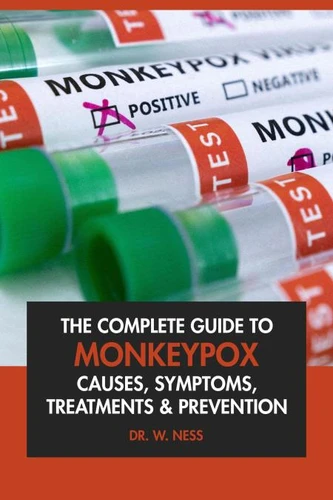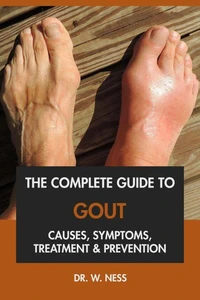The Complete Guide to Monkeypox: Causes, Symptoms, Treatment & Prevention.
Par :Formats :
Disponible dans votre compte client Decitre ou Furet du Nord dès validation de votre commande. Le format ePub est :
- Compatible avec une lecture sur My Vivlio (smartphone, tablette, ordinateur)
- Compatible avec une lecture sur liseuses Vivlio
- Pour les liseuses autres que Vivlio, vous devez utiliser le logiciel Adobe Digital Edition. Non compatible avec la lecture sur les liseuses Kindle, Remarkable et Sony
 , qui est-ce ?
, qui est-ce ?Notre partenaire de plateforme de lecture numérique où vous retrouverez l'ensemble de vos ebooks gratuitement
Pour en savoir plus sur nos ebooks, consultez notre aide en ligne ici
- FormatePub
- ISBN8227851741
- EAN9798227851741
- Date de parution15/08/2024
- Protection num.pas de protection
- Infos supplémentairesepub
- ÉditeurBig Dog Books, LLC
Résumé
Monkeypox, though less known than diseases like COVID-19 or Ebola, is a significant public health challenge, particularly in regions where the virus is endemic. First identified in monkeys in 1958, monkeypox primarily spreads to humans through contact with wild animals and can also be transmitted between people. Historically confined to Central and West Africa, the virus occasionally caused contained outbreaks.
However, in 2022, monkeypox surged unexpectedly across multiple countries outside Africa, raising global concerns about its spread and highlighting gaps in public health preparedness. This resurgence underscores the interconnected nature of global health and the challenges posed by emerging infectious diseases. It also reveals vulnerabilities in health infrastructure, surveillance, and response systems, especially for less well-known diseases.
Environmental factors, like deforestation and wildlife trafficking, further complicate the situation by driving the emergence and re-emergence of zoonotic diseases like monkeypox. The response to monkeypox emphasizes the need for a proactive and comprehensive approach to managing infectious diseases. International cooperation, strong national health systems, and clear communication are crucial in addressing these outbreaks.
The recent spread of monkeypox is a reminder of the ongoing threat posed by zoonotic diseases and the importance of vigilance, preparedness, and global collaboration to prevent future outbreaks and protect public health.
However, in 2022, monkeypox surged unexpectedly across multiple countries outside Africa, raising global concerns about its spread and highlighting gaps in public health preparedness. This resurgence underscores the interconnected nature of global health and the challenges posed by emerging infectious diseases. It also reveals vulnerabilities in health infrastructure, surveillance, and response systems, especially for less well-known diseases.
Environmental factors, like deforestation and wildlife trafficking, further complicate the situation by driving the emergence and re-emergence of zoonotic diseases like monkeypox. The response to monkeypox emphasizes the need for a proactive and comprehensive approach to managing infectious diseases. International cooperation, strong national health systems, and clear communication are crucial in addressing these outbreaks.
The recent spread of monkeypox is a reminder of the ongoing threat posed by zoonotic diseases and the importance of vigilance, preparedness, and global collaboration to prevent future outbreaks and protect public health.
Monkeypox, though less known than diseases like COVID-19 or Ebola, is a significant public health challenge, particularly in regions where the virus is endemic. First identified in monkeys in 1958, monkeypox primarily spreads to humans through contact with wild animals and can also be transmitted between people. Historically confined to Central and West Africa, the virus occasionally caused contained outbreaks.
However, in 2022, monkeypox surged unexpectedly across multiple countries outside Africa, raising global concerns about its spread and highlighting gaps in public health preparedness. This resurgence underscores the interconnected nature of global health and the challenges posed by emerging infectious diseases. It also reveals vulnerabilities in health infrastructure, surveillance, and response systems, especially for less well-known diseases.
Environmental factors, like deforestation and wildlife trafficking, further complicate the situation by driving the emergence and re-emergence of zoonotic diseases like monkeypox. The response to monkeypox emphasizes the need for a proactive and comprehensive approach to managing infectious diseases. International cooperation, strong national health systems, and clear communication are crucial in addressing these outbreaks.
The recent spread of monkeypox is a reminder of the ongoing threat posed by zoonotic diseases and the importance of vigilance, preparedness, and global collaboration to prevent future outbreaks and protect public health.
However, in 2022, monkeypox surged unexpectedly across multiple countries outside Africa, raising global concerns about its spread and highlighting gaps in public health preparedness. This resurgence underscores the interconnected nature of global health and the challenges posed by emerging infectious diseases. It also reveals vulnerabilities in health infrastructure, surveillance, and response systems, especially for less well-known diseases.
Environmental factors, like deforestation and wildlife trafficking, further complicate the situation by driving the emergence and re-emergence of zoonotic diseases like monkeypox. The response to monkeypox emphasizes the need for a proactive and comprehensive approach to managing infectious diseases. International cooperation, strong national health systems, and clear communication are crucial in addressing these outbreaks.
The recent spread of monkeypox is a reminder of the ongoing threat posed by zoonotic diseases and the importance of vigilance, preparedness, and global collaboration to prevent future outbreaks and protect public health.






















